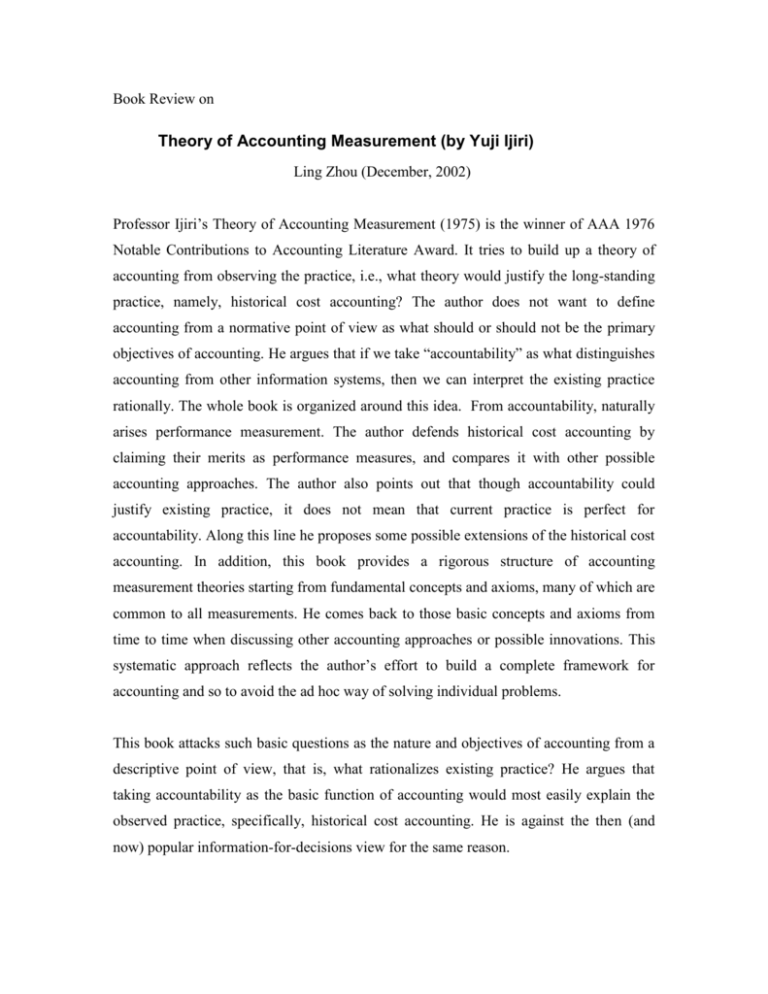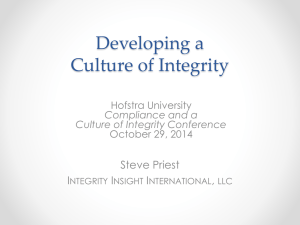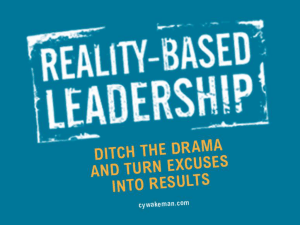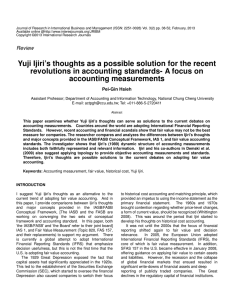Theory of Accounting Measurement (by Yuji Ijiri)
advertisement

Book Review on Theory of Accounting Measurement (by Yuji Ijiri) Ling Zhou (December, 2002) Professor Ijiri’s Theory of Accounting Measurement (1975) is the winner of AAA 1976 Notable Contributions to Accounting Literature Award. It tries to build up a theory of accounting from observing the practice, i.e., what theory would justify the long-standing practice, namely, historical cost accounting? The author does not want to define accounting from a normative point of view as what should or should not be the primary objectives of accounting. He argues that if we take “accountability” as what distinguishes accounting from other information systems, then we can interpret the existing practice rationally. The whole book is organized around this idea. From accountability, naturally arises performance measurement. The author defends historical cost accounting by claiming their merits as performance measures, and compares it with other possible accounting approaches. The author also points out that though accountability could justify existing practice, it does not mean that current practice is perfect for accountability. Along this line he proposes some possible extensions of the historical cost accounting. In addition, this book provides a rigorous structure of accounting measurement theories starting from fundamental concepts and axioms, many of which are common to all measurements. He comes back to those basic concepts and axioms from time to time when discussing other accounting approaches or possible innovations. This systematic approach reflects the author’s effort to build a complete framework for accounting and so to avoid the ad hoc way of solving individual problems. This book attacks such basic questions as the nature and objectives of accounting from a descriptive point of view, that is, what rationalizes existing practice? He argues that taking accountability as the basic function of accounting would most easily explain the observed practice, specifically, historical cost accounting. He is against the then (and now) popular information-for-decisions view for the same reason. When ownership and management are separated, a system to record and report activities and their consequences becomes necessary. Implicit in accountability are the goals to be achieved and so the measurement of performance with respect to these goals. Accounting measurement thus should be analyzed from the viewpoint of performance measurement. Since there usually exist conflicts of interests between the accountor and accountee, or among the accountors or accountees (e.g., current versus future shareholders, debtholders versus shareholders), we need performance measures that are unequivocal and unambiguous – or, hard. A “hard” measure is one that it is difficult for people to disagree. It goes beyond the often cited “objectivity” in requiring the standardization and uniqueness of measurement. As the author points out, objectivity can be interpreted as a high degree of agreement among neutral accountants, while hardness assumes a competitive environment. Suppose we give two groups of measurers incentives to push the measure in opposite directions, the degree of dispersion in the combined distribution by biased measurers can be called “hardness”. So it is possible to have two measures where one is more objective, but less hard than the other. The author argues that the outcome of the measurement under competitive circumstances is often far more revealing than the result in a neutral situation since neutral often means that people are indifferent to the outcome. With historical cost, we have supporting records of all actual transactions in the past, thus an accountability network based on actual transactions. In terms of performance measurement, historical cost can be justified when the entity cannot increase its monetary resources until its assets are converted into monetary resources. Then we may prefer to maintain the current valuation instead of adjusting for transient fluctuations. Alternative valuation methods can be useful in certain circumstances, but it is hard to argue their superiority over historical cost as a system. Replacement cost or realizable value is based on actions that the entity is not likely to take, for example. The book argues against the popular idea that accounting is a system for providing information useful for economic decisions. The following problems are what the author proposes for this information-for-decisions view. It is hard to separate accounting information from all other heterogeneous information used in decisions to establish the specific characterization of accounting. And with an emphasis on users, this approach fails to recognize the conflicting interests between the accountor and accountee. I do not agree with the author on the second point, i.e., information-for-decisions view would necessarily overlook the conflicting interests. The decision maker could take into account the reporting incentives of the managers when evaluating the financial reports. I do no see why the user-oriented view emphasizes the need for unbiased information, or grants users the right for any decision-relevant information as argued by the author. In fact, at the conceptual level, I believe that accountability can be derived from the information-for-decisions viewpoint. Here the decision maker would be the “accountee”—those the entity should be accounted for. Because they are separated from the operations, for their decisions as where to put their money, they need a record of all actual transactions so that the entity would be held accountable.











